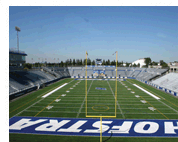For One Baseball Player Nothing Was ImpossibleJan 16, 2014Posted by james
Just prior to this past Thanksgiving Day we lost Lou Brissie. The name may not be familiar to anyone who was not around when he played Major League Baseball during the late 1940s and early 1950s. That doesn’t matter. It is what he did outside of baseball that is the true measure of this man.
Let’s begin with a little inside baseball. Brissie was a star semipro southpaw pitcher from South Carolina who caught the eye of Philadelphia Athletics owner and manager Connie Mack. He encouraged Brissie to go to college, and he even paid for it, with a guarantee that the pitcher would be invited to spring training in a couple of years. Eventually, Brissie pitched three years for the Athletics and then three years for the Cleveland Indians. He threw three innings during the 1949 All-Star game at Ebbets Field.
Brissie, though, had some business to address before he finished college and played for Mack. He enlisted in the U.S. Army during 1942, trading a college classroom and mound for the battlefield and his position as a combat infantryman. On December 7, 1944, while on patrol with his unit in northern Italy, a shell exploded. Brissie broke his right foot, injured his right shoulder. The shinbone in his left leg was shattered into more than 30 pieces.
Brissie was evacuated to a hospital in Naples. Doctors were ready to remove the leg when Brissie told them about his baseball dream. The doctors wired together the bone fragments and Brissie recovered with the help of a new wonder drug—penicillin. Over the next two years, he had 23 more operations.
During his post-war baseball life and after, Brissie realized that he had become a symbol of success to many veterans who tried to overcome various personal problems. At first, he had been hesitant to talk about his war wounds. Then, upon hearing from so many people with disabilities who found their encouragement through Brissie’s accomplishments, he realized that his situation could help others.
Brissie vowed not to let them down. Even as he got older, Brissie, walking with crutches with a left leg scarred, misshapen and still prone to infection, often visited a local Veterans Affairs hospital. He talked with soldiers who had been wounded in Iraq and Afghanistan.
Until the day he passed away, Brissie kept a steel watch he had purchased at an Army PX. The watch was frozen at 10:47:53 a.m., the moment the shell burst near him. It was his reminder of bad luck but of his eventual good fortune.
“The thing that I got out of all this,” he said during 2001, “is even the things that look impossible aren’t.”
Jim









